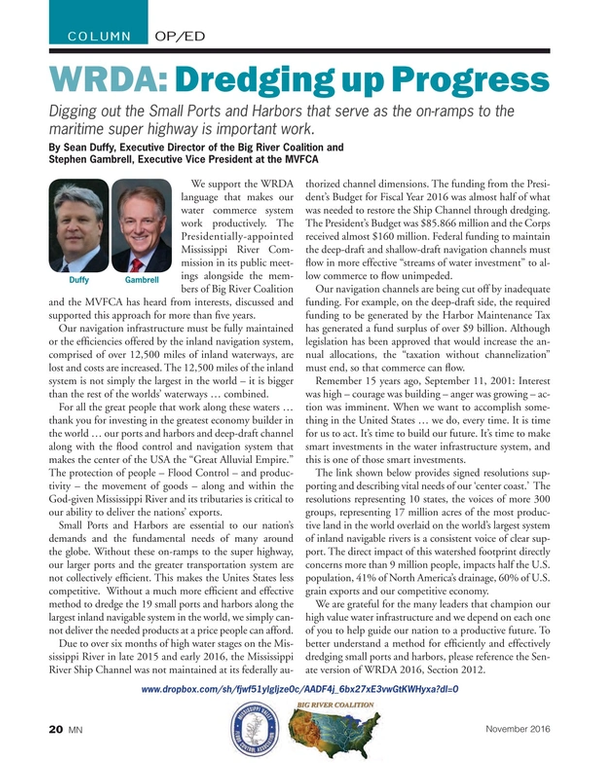
[Op/Ed] WRDA: Dredging up Progress
By Sean Duffy and Stephen Gambrell
Digging out the small ports and harbors that serve as the on-ramps to the maritime super highway is important work.
We support the WRDA language that makes our water commerce system work productively. The Presidentially-appointed Mississippi River Commission in its public meetings alongside the members of Big River Coalition and the MVFCA has heard from interests, discussed and supported this approach for more than five years.
Our navigation infrastructure must be fully maintained or the efficiencies offered by the inland navigation system, comprised of over 12,500 miles of inland waterways, are lost and costs are increased. The 12,500 miles of the inland system is not simply the largest in the world – it is bigger than the rest of the worlds’ waterways … combined.
For all the great people that work along these waters … thank you for investing in the greatest economy builder in the world … our ports and harbors and deep-draft channel along with the flood control and navigation system that makes the center of the USA the “Great Alluvial Empire.” The protection of people – Flood Control – and productivity – the movement of goods – along and within the God-given Mississippi River and its tributaries is critical to our ability to deliver the nations’ exports.
Small Ports and Harbors are essential to our nation’s demands and the fundamental needs of many around the globe. Without these on-ramps to the super highway, our larger ports and the greater transportation system are not collectively efficient. This makes the Unites States less competitive. Without a much more efficient and effective method to dredge the 19 small ports and harbors along the largest inland navigable system in the world, we simply cannot deliver the needed products at a price people can afford.
Due to over six months of high water stages on the Mississippi River in late 2015 and early 2016, the Mississippi River Ship Channel was not maintained at its federally authorized channel dimensions. The funding from the President’s Budget for Fiscal Year 2016 was almost half of what was needed to restore the Ship Channel through dredging. The President’s Budget was $85.866 million and the Corps received almost $160 million. Federal funding to maintain the deep-draft and shallow-draft navigation channels must flow in more effective “streams of water investment” to allow commerce to flow unimpeded.
Our navigation channels are being cut off by inadequate funding. For example, on the deep-draft side, the required funding to be generated by the Harbor Maintenance Tax has generated a fund surplus of over $9 billion. Although legislation has been approved that would increase the annual allocations, the “taxation without channelization” must end, so that commerce can flow.
Remember 15 years ago, September 11, 2001: Interest was high – courage was building – anger was growing – action was imminent. When we want to accomplish something in the United States … we do, every time. It is time for us to act. It’s time to build our future. It’s time to make smart investments in the water infrastructure system, and this is one of those smart investments.
The link shown below provides signed resolutions supporting and describing vital needs of our ‘center coast.’ The resolutions representing 10 states, the voices of more 300 groups, representing 17 million acres of the most productive land in the world overlaid on the world’s largest system of inland navigable rivers is a consistent voice of clear support. The direct impact of this watershed footprint directly concerns more than 9 million people, impacts half the U.S. population, 41 percent of North America’s drainage, 60 percent of U.S. grain exports and our competitive economy.
We are grateful for the many leaders that champion our high value water infrastructure and we depend on each one of you to help guide our nation to a productive future. To better understand a method for efficiently and effectively dredging small ports and harbors, please reference the Senate version of WRDA 2016, Section 2012.
The Authors
Sean Duffy is Executive Director of the Big River Coalition, and Stephen Gambrell is Executive Vice President at the MVFCA .
Sean Duffy is Executive Director of the Big River Coalition, and Stephen Gambrell is Executive Vice President at the MVFCA .
(As published in the November 2016 edition of Marine News)
Read [Op/Ed] WRDA: Dredging up Progress in Pdf, Flash or Html5 edition of November 2016 Marine News
Other stories from November 2016 issue
Content
- [Op/Ed] WRDA: Dredging up Progress page: 20
- Catching the Electric Vision page: 22
- Workboat vs. Jet Ski: A Mysterious Collision and Its Consequences page: 26
- Clear Contractual Language: What Are You Agreeing To? page: 30
- What to Know When Welding Primer-Coated Steel page: 34
- As Operators Look for the Bottom, Gulf Gloom Persists page: 38
- All in a Day’s Walk page: 46
- From Across the Big Pond page: 54
- Repair Yard Detyens Taps into Key Niche Markets page: 60
- Ship Intelligence 101 page: 66
- Lubricants: Mitigating Risk without Sacrificing Performance page: 74
- Tech File: Vesconite Rudder Bushings page: 84
- Digital Technology Enhances Marine Communications page: 90


